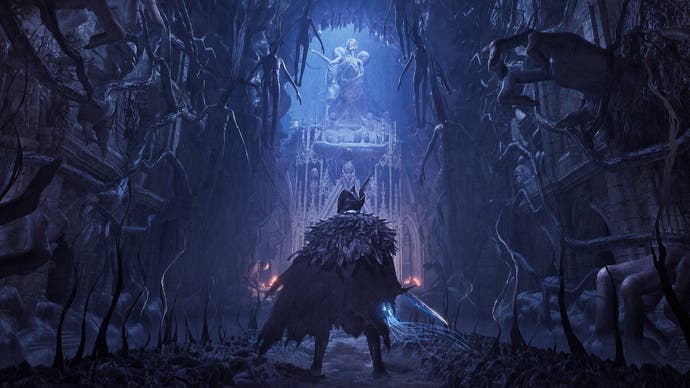The new Lords of the Fallen takes aim at Elden Ring's massive soulslike success
"Back in the day, soulslikes were popular. Now they're mainstream."
Important questions first: what's the deal with Lords of the Fallen's name? The first one, you'll remember, came out the best part of a decade ago in 2014, but that was also called Lords of the Fallen - and this new one isn't a remake. Or maybe it is.
Talking to Cezar Virtosu, HexWorks' Creative Director, out at GDC, I realised there's a bit more to this one. You'll probably know Lords of the Fallen (2023) was, up until just last week's big tech reveal at the Unreal showcase, originally called The Lords of the Fallen, a confusingly close name to the original but at least one that's marginally different. Now, developer HexWorks has dropped the "The" - but before that there was another name too. The first plan was, Virtosu tells me, to call it Lords of the Fallen: the Dark Crusade, "because this is about the Dark Crusade, you'll see it in promotional materials - but that felt like we were possibly making DLC."
So, he explained, then the studio dropped the subtitle and added the "The", then realised the confusion and, also, that the studio really was "utterly rebooting it - this is Unreal [Engine] 5, none of the previous tech, none of the previous paradigms, it could only be Lords of the Fallen. It sounds meandering, but it's been a trip to arrive here!"
That's reinforced by much of our conversation, in fact. Lords of the Fallen (2023) has been in full-time production for around three years - starting right as the pandemic hit, with predictably big challenges coming with that - and in that time it's also undergone a series of revisions. That's because this time, its development is taking place in tandem with regular bouts of community feedback - in part as a response to the lukewarm reception to the 2014 game, which still sits at the dreaded "Mixed" user reviews average on Steam today.
This has led to some of Lords of the Fallen's biggest changes from the original. For one, its main character, Harkyn, is gone, replaced with the typical FromSoftware-style character creator that, as was demonstrated to me in a lengthy, hands-off look at the game, includes all the usual quirks: body shapes, sliders, weird haircuts, big screens of numbers, the rest. There's a wider range of classes - a couple standouts we saw were the Black Feather Ranger and the Pyomancer - and there's more difficulty, complexity, scale.
With such a strong emphasis on community input, though, comes the risk of losing a cohesive vision that starts with the developer. Virtosu explained how HexWorks has dealt with that - the trick is to say to yourself, "We will focus on these three things being perfect, which we call the 'crown system'. We have melee, bosses, and Umbral. Golden crowns. Underneath is the other [feedback], we cannot focus on everything.
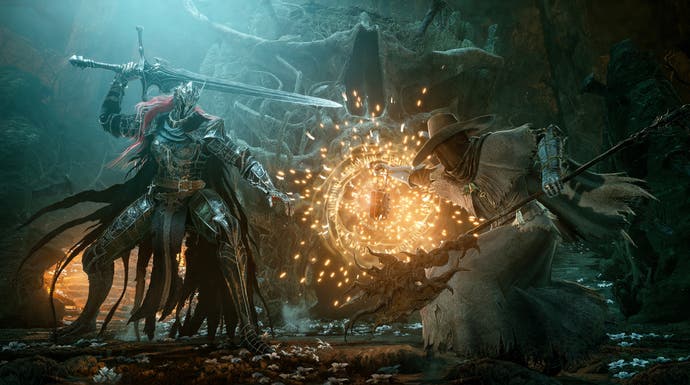
"Feedback will take you places… and if you see feedback that attacks one of your main pillars, that is not something you should regard, because the goal is to pick something and over-deliver, instead of trying to [ensure] everyone is able to eat well."
Umbral, by the way, is Lords of the Fallen's big twist, a core feature that takes what is otherwise a game that looks like a straight shot at a next-gen Dark Souls and grants it some personality of its own. In brief, Umbral is a second world which exists in tandem with the main one, visible seemingly at all times when you raise your magic lantern, its blue glow peeling back one layer to reveal another, and allowing you to step between worlds.
It's a remarkable thing in motion, feeling like the type of mechanic that really could only work at this fidelity - Lords of the Fallen is lavishly detailed - with the extra oomph of current-gen hardware. In the blue haze of the Umbral dimension, new routes appear, like branching paths, secret platforms, mechanisms for opening locked doors, and exploration, Virtosu tells me, has become a central part of Lords of the Fallen's open-but-with-gates world.
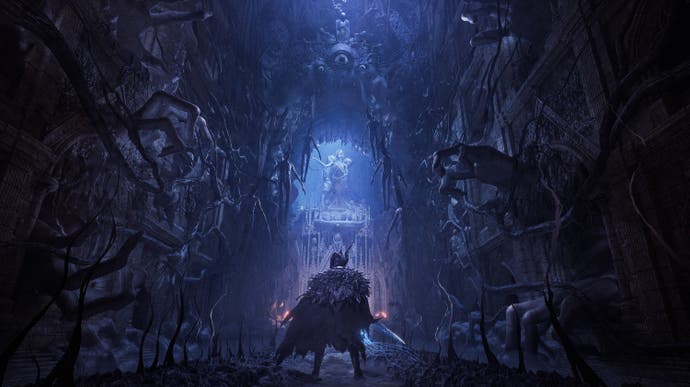
But above all, in Umbral world things are effectively just even Dark Soulsier than before. Enemies are more vicious, there's a winking eye in the corner of the UI that gradually opens the more cowardly you are - by running from enemies, for instance - presumably killing you outright if you constantly flee. And the environment, naturally, is plastered with gaping skulls and jumbo clumps of cartilage, those secret paths often made from vast, hellish spinal cords stretching out from newly revealed platforms.
It's also closely tied to Lords of the Fallen's unique take on death: there are save points this time, and you can place them wherever you like yourself. The catch, since that all sounds rather easy, is that enemies can destroy them, and that they're very expensive to place, and so their use becomes a question of terrain mastery and ingenuity. Dying, meanwhile, takes you into the Ubra realm where you'll have a chance to fight your way back out - or run away to a location that'll bring you back instead, assuming you can avoid opening that eye - while dying in Umbral takes you all the way back to your previous save.
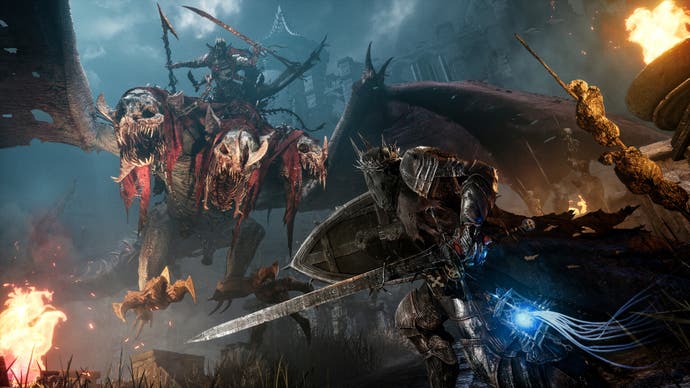
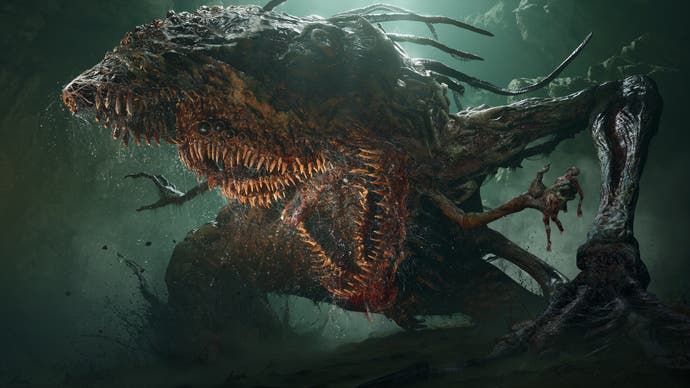
Despite that twist, though, Lords of the Fallen is maybe the closest game I've seen to Dark Souls that hasn't come from FromSoftware itself. Stylistically, thematically, even in the very literal sense, it's even in the wall-of-numbers RPG menus and delightfully freakish bosses, including one, backwards-walking monstrosity motion-captured by a Canadian contortionist on all fours. There will be a challenge here for HexWorks, not just to step out of the vast shadow cast last year by Elden Ring, but to avoid a sense of derivativeness that comes from adhering so closely to its recipe.
"When we started," Virtosu said, "the golden standard was Dark Souls 3. The Dark Souls paradigms were Dark Souls 3 and Bloodborne… we had Nioh and we had The Surge, we had examples. We had to do our own thing." At this point, he said, the team asked themselves, "what will be the place where people want innovation, three years down the line? The combat needs to be orthodox and correct, I think this is a place where we can innovate safely - thank god we didn't choose mounted combat!"
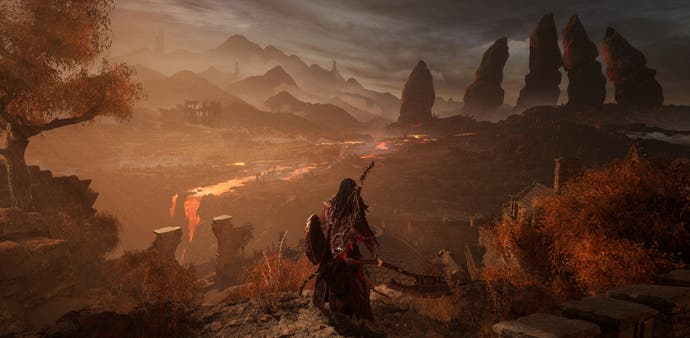
"We chose our things and we launched [development]," he said, "now Elden Ring came and hit the industry like the fist of an angry god - I mean we expected greatness, we did not expect excellence. We braced for impact, we saw the flail and all the weapons with all the same things," he joked, "they had the flying girl, we had the flying girl. [But] we cannot course correct to address something - you cannot say we need to be better than Dark Souls. We can only do our own thing, and over-deliver there.
"We were incredibly grateful to Elden Ring in that, back in the day, soulsikes were popular. Now they're mainstream. And we believe that with our niche and the current gameplay, there is a place for Lords of the Fallen to thrive."
From my perspective, at least from the purely hands-off one for now, it looks like there'll be plenty of room for it. Lords of the Fallen looks big, both in the scale of its world but also the potential scale of its audience. It looks like a big, challenging, fiercely detailed and crucially, inventive take on a dark fantasy RPG. Those things tend to do pretty well.
